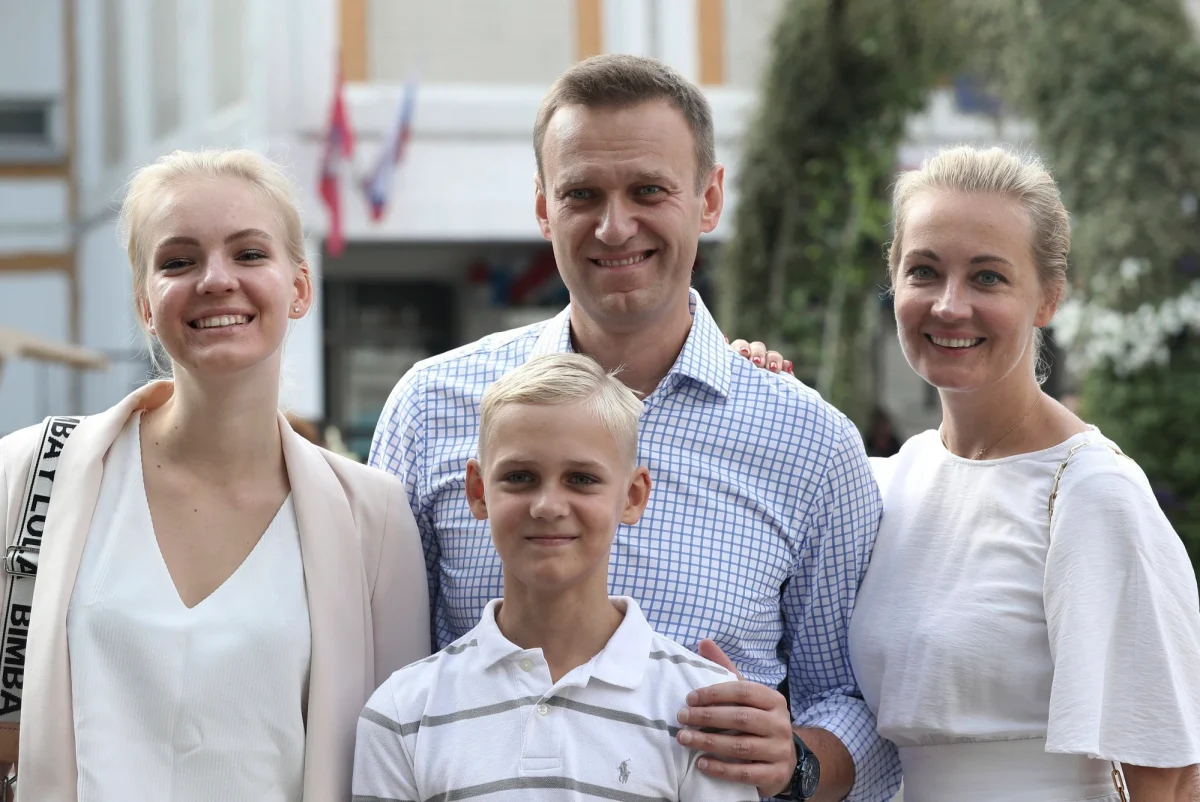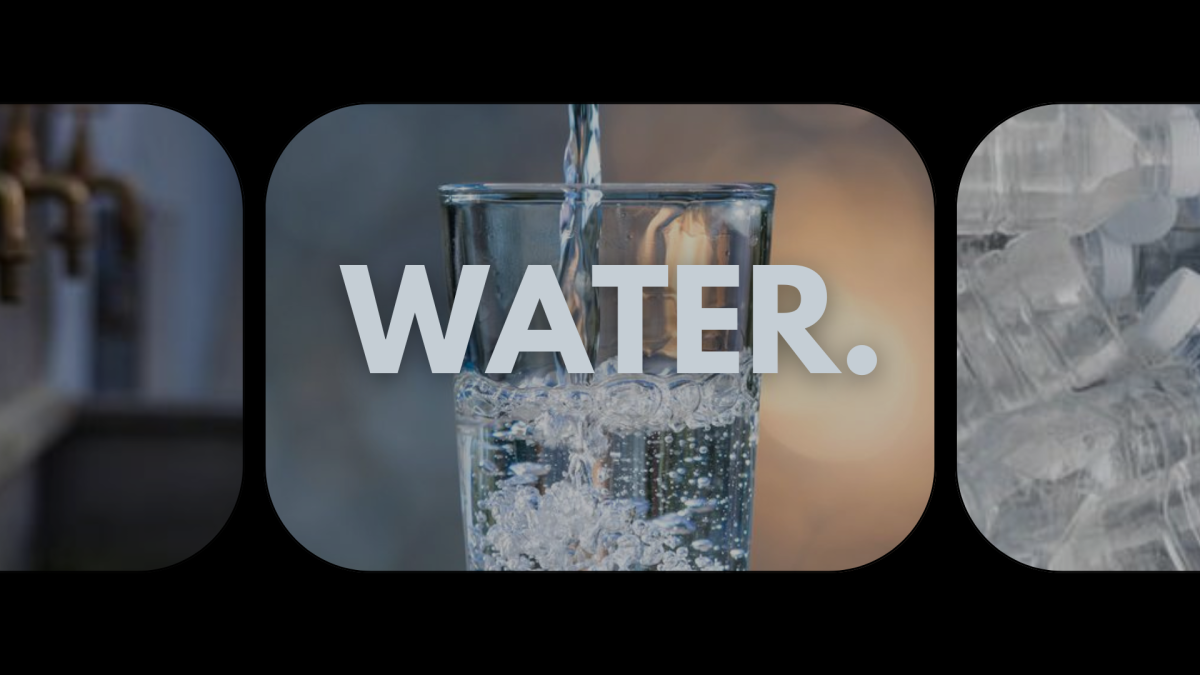As images of beautiful sunsets, fields of flowers, and mesmerizing beaches grace our screens, it’s easy to forget the harsh reality facing our planet. Behind this stunning facade lies a crisis of epic proportions—one that sees a million plastic bottles purchased worldwide every minute, with around 60 million ending up in AMERICAN landfills daily.
Our oceans, once flourishing with life, now face a grim forecast: by 2050, plastic water bottles are projected to outnumber the fish. One question remains: are we willing to let this scenario reveal itself, or will we finally take a strong stand for change?
Drinking water from plastic bottles has become an everyday way of life for most. Many do not think about what these bottles are made from or where they end up.
In the modern day, it’s evident that the convenience of plastic water bottles is undeniable. Yet, it comes at a staggering cost. Not only do they contribute to deforestation, climate change, waste, and air pollution through their production and disposal, but they also pose a horrid threat to marine life, human health, and oil use.
It is upsetting to think that millions of marine animals die each year due to plastic waste. Despite this looming crisis, a deep-rooted awareness of the plastic dilemma, coupled with a sense of helplessness prevails among the BCA student body.
“Honestly, I think a lot of people know the impacts of plastic, but there isn’t much they can do about it so they don’t really care,” said an ACTS senior. So, with an attitude like this, how should we really address this? Can we do anything?
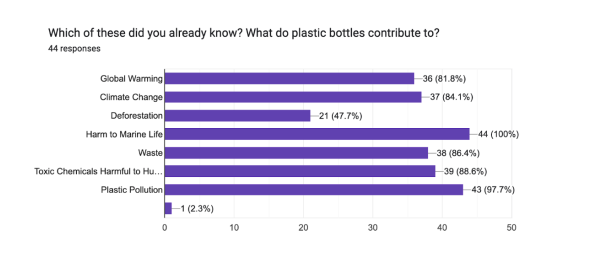
A quick glance at the statistics from recent surveys sent out to BCA students highlights the urgent need for action. While 97.8% of respondents claimed awareness of the impacts of plastic bottles, a significant portion (more than 60% for each) remained unaware of key facts, as represented earlier.
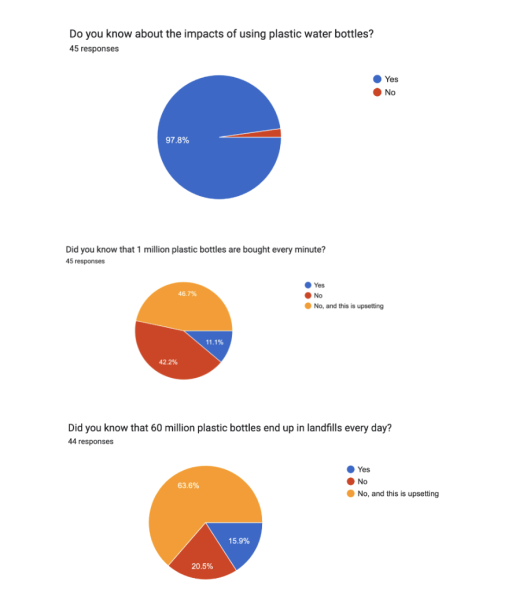
While interviewing an ABF Junior, her views on plastic bottles were discovered, and how even though she sometimes uses plastic bottles, she states she “always remembers to recycle them.”
Addressing the misconception surrounding recycling, through research, it becomes clear that it’s not the ultimate solution. Recycling processes contribute to large amounts of water pollution and heavily increased energy consumption, with 85% of plastic bottles that end up in recycling bins, still failing to be properly recycled, and eventually ending up in landfills. It leads us to alter the phrase we knew to be true (Reduce, Reuse, and Recycle) and now remember to embrace “Reduce, Reuse, and Raise Awareness.”
One interviewee, who is part of BCA’s Sustainability Club, pointed out that “Coca-Cola alone churns out 100 billion plastic bottles annually.”
Another student, an ATCS freshman, mentioned how he recently learned that “more than 93% of Nestle’s plastic packaging is made of PET (Polyethylene Terephthalate), which is a non-biodegradable polymer,” as it cannot (easily) be broken down by natural organisms.
Some plastic bottles take around 450 years to decompose (plastic bags taking 1000 years), and, even then, they are not gone, but they are simply broken down into smaller particles that are too small to be seen, or micro-plastics.
However, with this in mind, there’s still hope for a global movement against plastic bottle usage. With 38 billion plastic water bottles sent to US landfills yearly, by encouraging the adoption of sustainable alternatives, implementing more water refilling stations, and pressuring corporations to reduce plastic production, individuals can make a tangible impact.
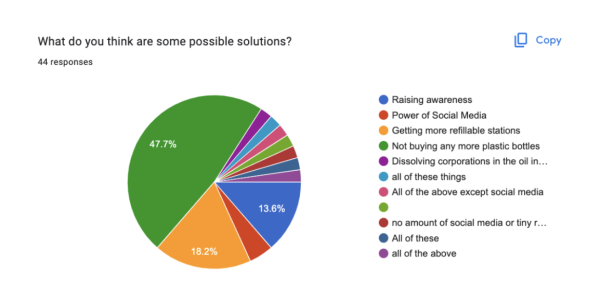
When asking BCA students about different solutions, as well as their feelings about potential impacts, an interesting revelation was made. The most popular belief, regarding a solution to combat the plastic bottle crisis, was to refrain from buying plastic bottles.
Also, while 13.6% of the participants agreed on selecting the presented solution of raising awareness, and a silent 4.5% believed in the power of social media, with one even going to the lengths of stating, “All of the above except social media.”
Yet, it was exciting to see there were many new responses added to the mix, including those from multiple different students adding in their own views. While many pointed out “all of the above,” or “All of these,” one student quoted, “No amount of social media or tiny refillable stations will fix the problem since it is mostly large companies that are producing all this waste.” This again brings up the question, “What can we do to solve this problem?” Some believe that certain industries are largely accountable for Another stated their perspective, quoting how they believe in “dissolving corporations in the oil industry and other industries related to plastic production [and] prosecuting their CEOs for ravaging the environment.”
When learning more about the other potential opportunities and solutions that have resonated with BCA students, one interviewee mentioned how they felt that “social media did have a major impact on… [them, as it led them to] becoming vegan, an advocate for sustainability, biking to school, and even selling personalized water bottles and tote bags.”
Another AMST student mentioned how he believed that “to get to the root of this problem, we honestly need to figure out how to get governments, of multiple countries, to either ban these single use plastics, including bottles, of course, or figuring out a quick solution, as it’s our only way of combating this on a major scale.”
Finally, when interviewing employees of grocery stores and local convenience stores, in Bergen County, one owner, Jeff, noted how, throughout his 7 years with the store, he had always seen “stacks and rows of thousands of plastic water bottles, with the few, maybe 10-15, reusable ones tucked behind, usually in the bottom and at the end of the aisle.”
Another interviewee, Aaron, mentioned how he would see “crates of bottles ship in, daily, and while (he is happy that) bottles like Fiji use 100% recycled plastic (rPET, he expresses his concern about how) it is upsetting that they are so expensive… like two bottles of Fiji cost around $5, but a crate of 50 usually costs around $15.”
Lastly, an employee at Acme mentioned how “awareness will help people make changes to their routine and while we can’t stop selling these products, maybe people will decide to stop buying them, and hopefully that will create change.”
Ultimately, it is clear that the solution lies within ourselves. Despite the convenience of plastic bottles, their widespread use, internationally, contributes to a multitude of environmental and health problems: including air pollution, human harm, wildlife harm, global warming, and waste disposal. While recycling is often quoted as a solution, it’s evident that it’s not enough, with a majority of plastic bottles still ending up in landfills.
However, there is still hope for change through reducing plastic consumption and raising awareness. By embracing sustainable alternatives and pressuring governments and corporations to take action, people can together work towards a futurewhere plastic pollution is significantly reduced, and our planet, air, and oceans, are healthier for generations to come.
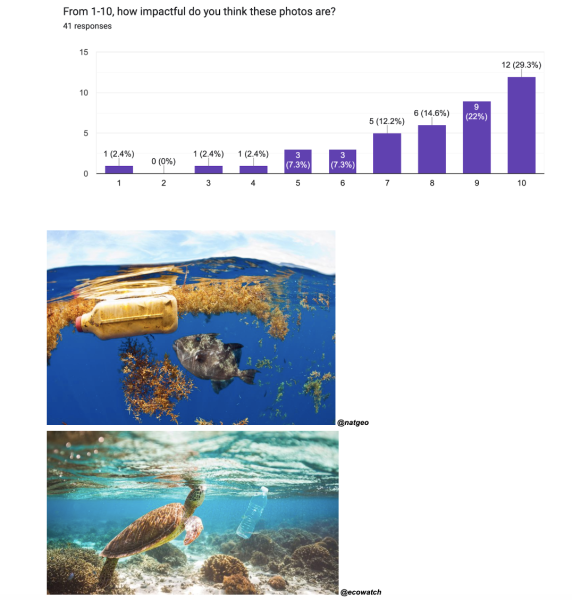
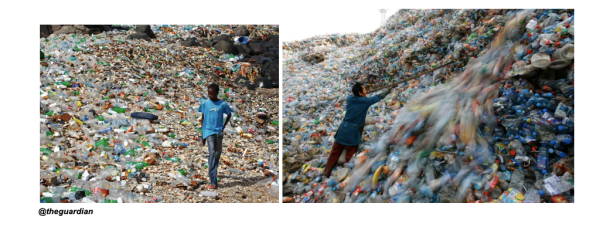
Sources:
https://education.nationalgeographic.org/resource/one-bottle-time/
https://www.earthday.org/2018/03/29/fact-sheet-single-use-plastics/
https://www.water.org.uk/news-item/national-refill-day/
https://plasticoceans.org/the-facts/
https://www.forbes.com/sites/trevornace/2017/07/26/million-plastic-bottles-minute-91-not-recycled/
https://www.sas.org.uk/our-work/plastic-pollution/plastic-pollution-facts-figures/
https://waterbottles.healthyhumanlife.com/plastic-water-bottle-pollution-plastic-bottles-end/
https://plasticoceans.org/infographic-reduce-plastic-pollution/
https://www.bbc.co.uk/news/science-environment-42264788
https://www.rubiconglobal.com/blog-ocean-pollution-facts/
http://oceancrusaders.org/plastic-crusades/plastic-statistics/
https://www.nationalgeographic.org/encyclopedia/great-pacific-garbage-patch/
https://www.nationalgeographic.com/news/2018/05/plastics-facts-infographics-ocean-pollution/
https://www.earthday.org/2018/04/05/fact-sheet-plastics-in-the-ocean/
https://www.jerseyislandholidays.com/plastic-bottle-pollution-statistics/#chapter-8
https://www.onelessbottle.org/about-us/




